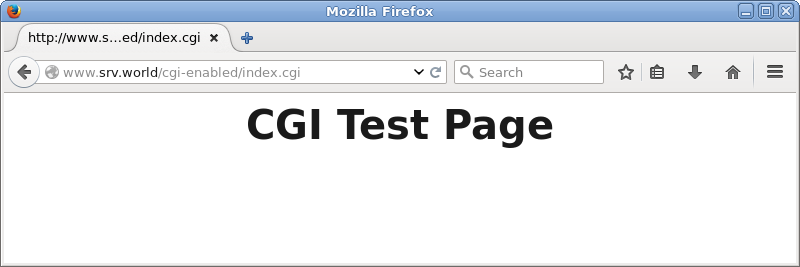|
Use Perl Script
2014/08/25 |
|
Configure httpd to use Perl as CGI Scripts.
|
|
| [1] | Install Perl. |
|
[root@www ~]# yum -y install perl perl-CGI
|
| [2] | By default, CGI is allowed under the "/var/www/cgi-bin" directory. It's possible to use Perl Scripts to put under the directory. All files under it is processed as CGI, though. |
|
# the settings below is the one for CGI [root@www ~]# grep -n "^ *ScriptAlias" /etc/httpd/conf/httpd.conf 247: ScriptAlias /cgi-bin/ "/var/www/cgi-bin/" |
| [3] | If you'd like to allow CGI in other directories, configure like follows. For example, allow in "/var/www/html/cgi-enabled". |
|
[root@www ~]#
vi /etc/httpd/conf.d/cgi-enabled.conf # create new # processes .cgi and .pl as CGI scripts <Directory "/var/www/html/cgi-enabled"> Options +ExecCGI AddHandler cgi-script .cgi .pl </Directory> /etc/rc.d/init.d/httpd restart |
| [4] | If SELinux is enabled and also allow CGI under directories which is not the default like [3] above, change rules like follows. |
|
[root@www ~]# semanage fcontext -a -t httpd_sys_script_exec_t /var/www/html/cgi-enabled [root@www ~]# restorecon /var/www/html/cgi-enabled
|
| [5] | Create a CGI test page and access to it from client PC with web browser. It's OK if following page is shown. |
|
[root@www ~]#
vi /var/www/html/cgi-enabled/index.cgi #!/usr/bin/perl print "Content-type: text/html\n\n"; print "<html>\n<body>\n"; print "<div style=\"width: 100%; font-size: 40px; font-weight: bold; text-align: center;\">\n"; print "CGI Test Page"; print "\n</div>\n"; print "</body>\n</html>\n"; chmod 705 /var/www/html/cgi-enabled/index.cgi |

|